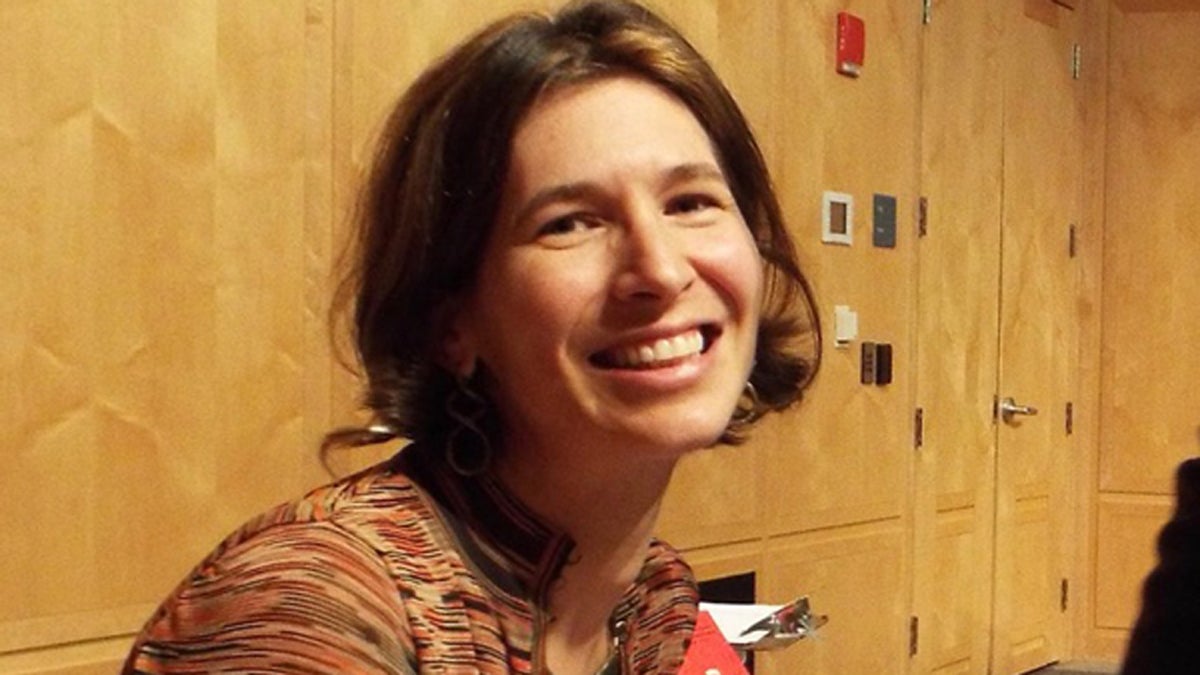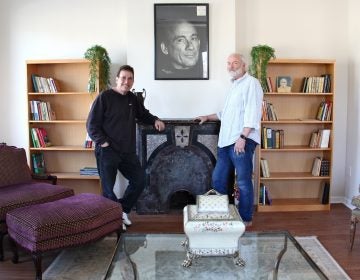Princeton poet’s debut novel features disappearing ‘translator superhero’
Listen
Idra Novey pauses during a signing for her new book, "Ways to Disappear." (Jeanette Beebe/for WHYY)
“Ways to Disappear” by Idra Novey, a poet, translator, and lecturer in creative writing at Princeton University, is a genre-blending, mash-up of a novel that follows Emma, an American translator, on her quest to find Beatriz Yagoda, a Brazilian author whose work Emma translates.
Novey was born in Western Pennsylvania and features that landscape in the book.
“Outside the rented, somewhat shabby house in Pittsburgh, it was snowing sideways. In Rio de Janeiro, it was 106 degrees,” begins a selection she read this week during a gathering at the Princeton Public Library. In the audience sat several of her own students and colleagues — including the Pulitzer Prize-winning poet and translator Paul Muldoon, who, Novey said, was the first writer who really showed her what translation can do.
From her home in Pittsburgh, Emma learns that Beatriz has gone missing; the last sighting of the elusive artist and mother was in Rio de Janeiro, as she climbed into a tree. Beatriz simply “disappears.”
“I think what I’ve found is that you always just know a partial version of somebody, whether it’s your own mother or your own children or the author you translate,” said Novey. “I was interested in looking at how these partial versions of ourselves collide — and what could happen in Beatriz’s absence with these different versions of her that can’t be reconciled.”
“The beautiful questions that come up in translation, I think, are the beautiful questions that we all ask ourselves as people, which is, ‘How much do you not know?'” said Novey. “The unsaid is what matters the most.”
Emma vows to find Beatriz, then begins an adventure that holds the book together. It’s a story that combines the elements of a caper and noir-mystery, full of suspense. Novey said she wanted to write about a translator protagonist who reflects the community she knows — translators who are “full of life” and engaged “lovers of literature.”
“I think one reason I wanted to write this was that I kept coming across novels that had translator protagonists in them, and they were wrong. Just wrong,” Novey said. “I thought, I want to write a translator superhero! I want to portray translators as I’ve come to know them, and to show them as these characters in and of themselves.”
Translators are not only “full of life,” adventurous, and passionate, said Novey; they’re also creative. She says translation can be just as creative as writing fiction or poetry.
“You’re moving between languages, and you’re moving between cultures,” she explained. “And you have to occupy this floating fascinating space between them. I think it’s a creative act that requires so much emotional imagination and cultural imagination.”
Unlike writing fiction, said Novey, translating another’s work doesn’t require invention of plot or character. This leaves an opportunity to focus on other elements of language, including tone — which, she says, is a creative endeavor.
“The beautiful thing that I find with my students who do translation and then go on to write their own work is that they’ve learned how to isolate stylistic issues,” she said.
In addition to her post as a lecturer in creative writing at Princeton, Novey has taught at Columbia University, NYU, and the Catholic University of Chile. She has translated four books from Spanish and Portuguese, including “The Passion According to G.H.” by Clarice Lispector. She’s written three books of poetry: “Clarice: The Visitor” (with Erica Baum), “The Next Country,” and, most recently, “Exit, Civilian,” which was chosen for the 2011 National Poetry Series.
WHYY is your source for fact-based, in-depth journalism and information. As a nonprofit organization, we rely on financial support from readers like you. Please give today.





